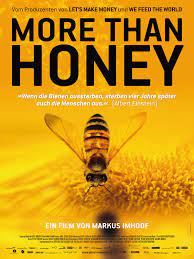
Starts November 8
Original language: German
 The Academy Award® nominated Swiss director Markus Imhoof (The Boat is Full) turns to a combination of nature film and global issue documentary. World-wide there are reports of mysterious deaths of honeybees and more than honey is at stake. Despite years of research, the precise cause of colony collapse remains speculation. In recent years several documentaries have taken on this subject (Colony, 2009) but Imhoff’s film stands out by employing the latest filmmaking technology and showing most remarkable microscopic shots of bees in full flight. His camera seems to swirl around effortlessly, catching bees mating in mid-air as well as capturing the breeding of queen bees inside the hive in minute detail.
The Academy Award® nominated Swiss director Markus Imhoof (The Boat is Full) turns to a combination of nature film and global issue documentary. World-wide there are reports of mysterious deaths of honeybees and more than honey is at stake. Despite years of research, the precise cause of colony collapse remains speculation. In recent years several documentaries have taken on this subject (Colony, 2009) but Imhoff’s film stands out by employing the latest filmmaking technology and showing most remarkable microscopic shots of bees in full flight. His camera seems to swirl around effortlessly, catching bees mating in mid-air as well as capturing the breeding of queen bees inside the hive in minute detail.
Imhoof, who comes from a family of beekeepers, gives an international perspective of the crisis being experienced in different parts of the world. On his journey around the globe - spanning California, Arizona, Europe, China and Australia - he examines the situation by talking to scientists, farmers and agricultural entrepreneurs. A California almond farmer, listening to the humming sound of bees whilst standing amongst an impressive sea of flowering almond trees, proclaims: “That’s the sound of money,” with a happy smile on his face. Without the bees he would have no almonds. We follow a group of truck drivers travelling all over the United States transporting bee colonies to huge plantations to work as pollinators. But not all seasons go well. It is sad to watch entire bee stocks dead on arrival. After discovering his loss, a beekeeper comments: “I’m getting real comfortable with death on an epic scale.” Was the cause stress during the long transport, parasites, fungicides, pesticide sprays or all of the above? On the other hand, the so-called “killer bees” are on the increase in the United States.
A very different scenario awaits Imhoff in north China. It looks like the future has already arrived; there are no bees! Farmers have to buy pollen from the south of the country, using human labour to pollinate their apple blossoms by hand. In Austria queen bees are artificially bred, then packed in little boxes and sent off via mail to start building a new colony elsewhere. Paying a visit to Imhoff’s son in Australia, we learn that everything is still intact with the bee population but he is aware of the dangers that could change the situation.
More than one third of our food production depends on pollination by honeybees and therefore their life and death are linked to ours. Einstein once said: “If bees ever die out, mankind will have only four years left to live”. An Arizona farmer has a positive outlook that the hardy “killer bees” have a good chance in surviving the onslaught of air pollution and pesticides. The film is more than just a documentary about bees. Dazzling nature photography by Jörg Jehsel, well-structured editing, interesting and lively portraits of people in different countries make it an entertaining 90 minutes. The film had its world premiere at the Locarno International Film Festival 2012.
